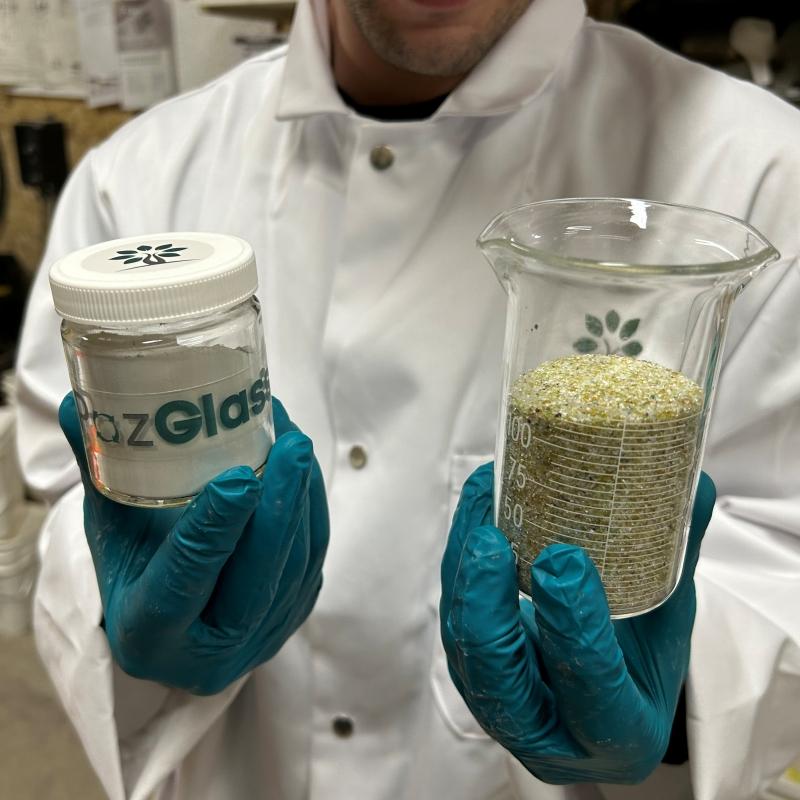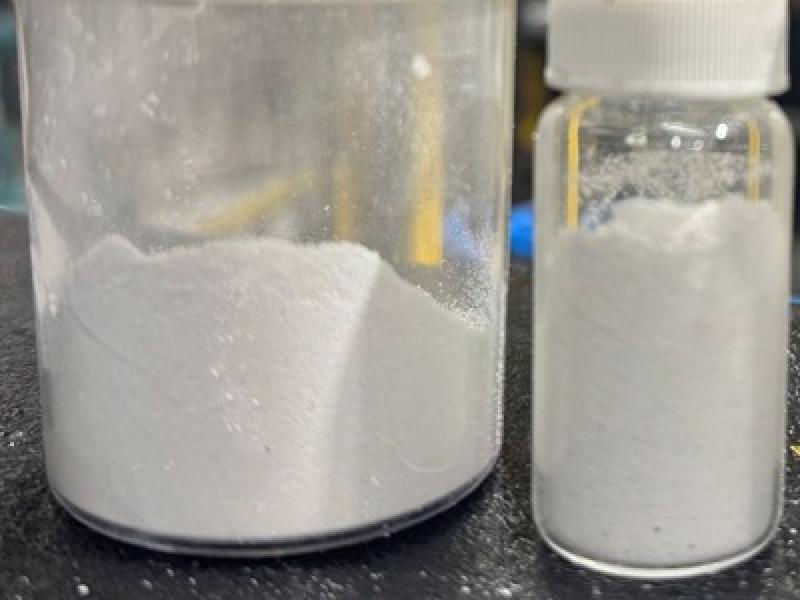
A Kamloops, B.C.-based company has completed the first pour of concrete enhanced with an alternative building material made from a product most of us throw away.
“We take post-consumer glass, and make it into amorphous silica, i.e. glass, and we are now taking that glass and using it to make a form of Roman concrete, which is stronger, tougher, better and we replace a percentage of Portland cement every time we use PozGlass,” Stephen Harpur, chief executive officer of Progressive Planet Solutions (PLAN-X), told Sustainable Biz Canada in an interview.
Cement manufacturing produces a substantial source of annual greenhouse gas (GHG) emissions — around seven per cent according to Canadian government sources, “through a process where the main mineral in Portland, limestone, when it’s heated up, it loses 44 per cent of its weight. It turns to CO2 (carbon dioxide),” Harpur said.
However, using the new product is much cleaner. “There is no off-gassing with PozGlass,” he said.
The process also produces permanent carbon sequestration by converting the sodium from soda-lime glass to calcium carbonate in limestone, according to Progressive Planet.
The company recently produced one tonne of finished PozGlass powder, along with its partner, Amrize (formerly Lafarge Canada). It was also able to replace 20 per cent of the Portland cement in six cubic metres of ready-mix concrete during a pilot project.
“Partnering with Progressive Planet to produce this first-of-its-kind concrete mix in British Columbia is an exciting milestone. Testing next-generation materials like PozGlass demonstrates what’s possible when industry and innovators come together,” Cory Cannon, the senior vice-president of commercial cement for Amrize, said in a release.
'Vastly superior to Portland cement'
For Harpur, this successful test showed that PozGlass works even better than traditional materials, which can suffer from a “common sickness in concrete” known as alkali-silica reactivity.
“You would have seen it many times where concrete spoils and degrades when the cement paste reacts with alkali aggregates. This is very common in Western Canada, and we have done a whole bunch of third-party testing with Amrize, and we’ve demonstrated that PozGlass is vastly superior to Portland cement in mitigating the formation of concrete cancer,” he said.
Progressive Planet also produces industrial minerals such as cat litter, chicken bedding and industrial absorbents to the tune of around $20 million per year, according to Harpur, and is now committed to produce 3,500 tons of PozGlass per year for Amrize.
The technology was first developed in 2019 but Progressive Planet is not resting on its laurels.
“We have filed a third provisional patent for another new cement that we are calling Gladiator SCM, of which PozGlass is a component,” he said.
While it is currently based in British Columbia, Harpur has set the company’s sights on bigger goals. “We see this working in cities all over the world.”
“Glass is consumed in largest quantities in large cities, and Portland cement and ready-mix concrete is utilized most in large cities. There’s a very beautiful circular story in that the cement powder, known as PozGlass SCM, is created where it’s used,” Harpur said.
Plans for pilot plant

While full commercialization hasn’t yet been achieved, the firm has received grants worth more than $5.7 million to build a demonstration facility to produce powder for Amrize.
“The pilot plant, there’s another purpose for it, and that is to generate what we call an LCA, or life-cycle-assessment number, which is a measure of the amount of CO2 that’s created to make one metric tonne of PozGlass," Harpur said.
"It is a fraction of the LC number of the average Portland cement plant, so the carbon footprint of the production of PozGlass is a fraction of that of the production of Portland cement.”
The company is targeting November 2026 to have its full production plant running.
“We did have a historic moment (on Nov. 19). We assembled a small plant out of some used equipment, and we produced one metric tonne of PozGlass, and we deployed that in our first-ever batch at our own facility.”
Because of ongoing transformation in Canadian energy production, Progressive Planet sees a golden opportunity for its technology.
“The supply of fly ash and steel slag, which are the two amorphous silica-based replacement cements. Currently, the supply of those is dramatically declining, because fly ash is made when you produce electricity from burning coal, and most of the plants in Canada are now shut down," Harpur said. "Twenty years ago, at least 80 per cent of the power in Alberta was produced by burning coal. Today it’s zero.”
“So, both of these huge industrial supplies of an alternative cement are rapidly declining.”
And with many building manufacturers shifting from wood to concrete, Harpur sees a bright future for PozGlass. “We envision a world where any ready-mix operator can have a silo which is filled with PozGlass and replaces the use of either steel slag or fly ash in their cement.”
Progressive Planet hopes to tap into the $15-billion-per-year market for Portland cement, according to Harpur.
“The consumption of Portland cement in 2011 in the continental USA, there were 62 million U.S. tons of Portland cement consumed, in 2021 it rose to 92 million, so just under 50 per cent growth in a decade.”










